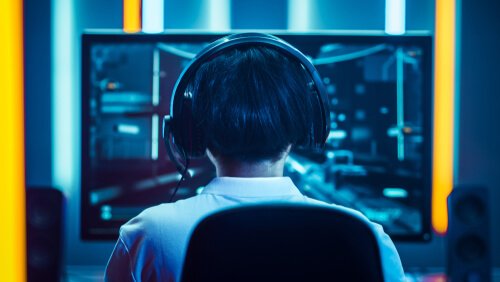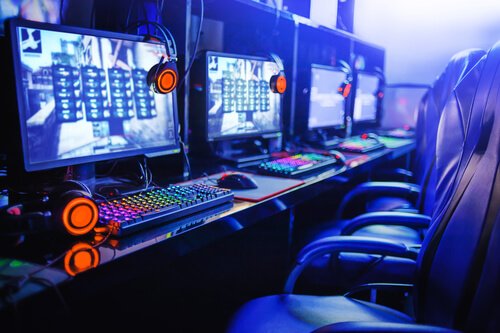The Psychology of eSports

The psychology of eSports has become more relevant nowadays. eSports are gaining popularity every year and it’s common to hear about them in the media. International eSport tournaments have millions of followers. They’re also excellent publicity for video game producers and promoters.
In this article, we’ll focus on two main issues. The first is the skills and behaviors good eSports players need. Secondly, we’ll analyze why these games are so attractive to new generations.
We’re going to review the primary traits of this phenomenon from a psychological point of view. Technology is advancing at a breakneck pace and video games can be a problem for a variety of reasons. However, they can also be a valuable tool in an intervention.
eSports: The Videogame Boom
Globalization has definitely had an impact on the eSports phenomenon. The videogame audience has increased dramatically in recent years.
Many people who grew up playing videogames and still play them as adults are now parents. Their children play as well, and people of every age in between. These days, it’s hard to imagine that everything started in the 70s with people getting together to play Pac-Man or Space Invaders.

The Internet Revolution
The ability to connect to the Internet and play online with other users revolutionized the market in the 90s. Large producers like Nintendo and Sony are constantly competing to out-sell each other.
Around that same time, industry leaders realized the importance of understanding their users’ demands. This is when they laid the foundation for the psychology of eSports.
Professionalization of eSports
The boom has been so significant that many people actually make a living playing videogames. The tournaments themselves have become internationally relevant. Massive competitions like the ones that started in Japan and South Korea have spread to the rest of the world.
How much the market has grown and the availability of sponsors make it possible for many people to make a living off of eSports. There are different game categories:
- Real-time strategy (RTS). These are games based on actual, real-life sports. One example is FIFA soccer tournaments.
- First-person shooter (FPS). War simulation games and armed mission games fall into this category. One example is the popular game Counter-Strike.
- Multiplayer Online Battle Arena (MOBA). This is the most popular kind of game where people fight in a fantasy world. League of Legends is one of the most popular MOBA games.
Why Are eSports so Popular?
Watching videos on YouTube of other people playing video games is an intensely popular activity among younger generations. This phenomenon puzzles many parents and older adults. After all, what could be so attractive about watching someone else play without participating? Psychologists propose the following explanations:
- Aesthetic. The art of playing well. Professional players offer an attractive narration of their gameplay.
- Drama. Watching other people participate in a competitive activity is exciting. In addition, when there are two or more players involved, it enhances the excitement.
- Escape. Like any other kind of entertainment, it’s a means of distraction for the viewers.
- A sense of belonging. Die-hard soccer lovers identify as fans, and eSport followers identify themselves as “gamers”. In other words, eSport followers also identify with a particular player or team.
The Psychology of eSports
These days, video games are used for a wide variety of reasons. From pilot training and attention-deficit/hyperactivity disorder intervention to education, video games can be a great educational tool.
Multiple studies support the idea that video games enhance cognitive abilities. However, their increasing complexity demands the very skills that they help develop.
The Main Psychological Skills Involved in eSports
From a psychological point of view, there are several “requirements” to be a good player. When we talk about “cognitive skills”, we mean the executive functions of the brain that are in high demand. Let’s take a look at some of the most used ones in eSports.
- Attention. Playing these types of videogames requires a high level of sustained attention. Players have to be attentive to every detail on the screen and some games can go on for hours.
- Planning. Since the strategy is a crucial part of eSports, planning is a fundamental skill. These games require a high-level ability to process the events of the game. They also require that you come up with quick, intelligent responses.
- Working memory. This ability consists of using all your cognitive resources on one task. Making the connection between what you’re seeing on the screen at the moment and things that already happened is key.
- Inhibition. Being able to control your impulses and focus your attention on one goal is another important eSports skill. One crucial aspect of the game is ignoring potential distractions.

What Do eSport Fans Want?
The demands of eSport fans along with constantly-evolving technology mean this industry is always changing. Psychologists have noticed these changes. These days, they seem to be following a trend. The realized that players and spectators value certain traits such as:
- Immersion. The more realistic the game is, the better. Players want to feel like they’re “inside” the game.
- Competitiveness. The producers tend to offer better scenarios and game modes.
- The story. Gamers want to play something with a complex story behind it. That feeds the myth and players’ sense of immersion.
- Realism and fantasy. The graphics are extremely important. That’s because they offer a certain degree of reality. However, a dose of realism can also complement the fantastical scenarios and stories because it awakens the players’ curiosity.
An Industry Plagued with Problems
eSport organizations struggle with problems that you also see in other sports organizations. Today, they’re threatening to ruin the industry. One of the problems is the proliferation of drugs and medications that help players pay attention and enhance their performance. Problematic gender stereotypes are also an issue. The potentially addictive quality of video games for children is a problem as well.
In conclusion, the field of psychology is becoming more and more interested in eSports. Looking at this phenomenon from a psychological point of view helps understand the traits that make it such a popular activity. Some researchers debate how “sporty” eSports actually are. Nevertheless, the cognitive skills that a professional gamer needs are undeniable. A psychological analysis of eSports can also help identify complications and problems within the games, as well as potential therapeutic applications.
This text is provided for informational purposes only and does not replace consultation with a professional. If in doubt, consult your specialist.








